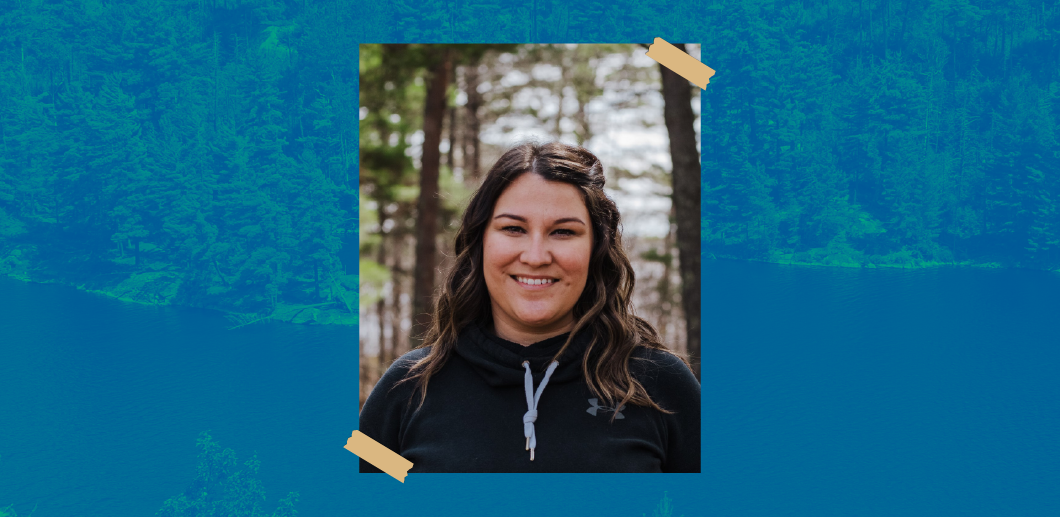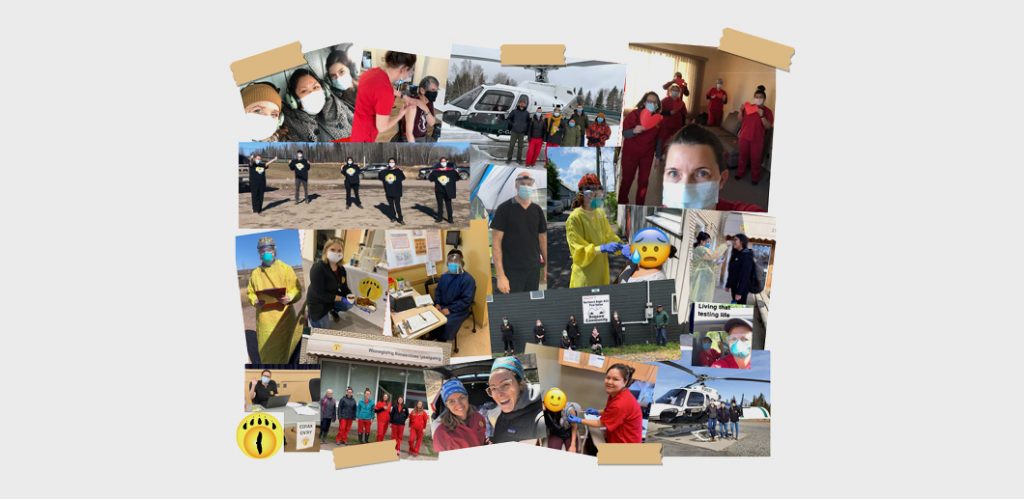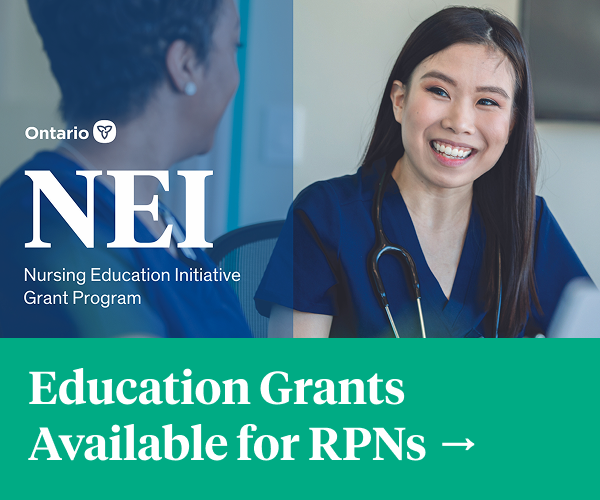
At seven years old, April Preisentanz drew a picture of herself in a nurse’s uniform for a school project and captioned it, “when I grow up, I want to be a nurse.”
She forgot all about it. Years later, her father presented her the artwork when she graduated from the Practical Nursing program from Confederation College. Dreams from her childhood have turned into reality for April, an Inter-Professional Team Coordinator (IPTC) with the Waasegiizhig Nanaandawe’Iyewigamig Health Access Centre (WNHAC) in Keewatin, ON.
When WNHAC received its first COVID-19 positive case last year, April and her team sprang into action. The pandemic was a test of April’s strength as a leader. In 2020, April transitioned from active nursing into a nursing leadership role.
As an IPTC, April provides supervision and oversight to the client-centred, inter-professional teams. This encompasses diverse service providers (regulated and non-regulated health professionals), promoting teamwork within and between teams and work groups while maintaining focus on the organization’s mission, vision, values and strategic direction.
Over the past year, April has worn different hats and sometimes struggled with not being alongside her peers on the frontlines, given her new administrative role. However, she has reflected on the impact she’s able to make in this different capacity. As she has embarked on this new journey, April notes that she’s become aware of the importance of adapting to change and finding balance.
“To be a successful leader, it is so important to practice the art of humility,” April says. “I am up for the challenge and will always do what is needed to support our staff to deliver a high quality of services to our clients.”
While the past year has presented many challenges and opportunities for April and her team, it has also been an opportunity for personal and professional development.
“I have been witness to the growth and change of so many employees that were required to re-deploy to alternate work assignments. It has allowed me to accept change more easily. I have witnessed resiliency firsthand, and I am so honoured to work with and lead such a competent and compassionate group of people. I’d like to think that their efforts over the last year are, in part, a reflection of who I am as a leader. In that lies my contribution to the fight against COVID-19.”
Ensuring access to care in Ontario’s North during the pandemic
April’s team provides primary health care to Indigenous and Metis clients in the Kenora area, including several remote communities.
During summer, they travel by boat, and in the winter, fleet vehicles serve them well on the ice roads. When other transportation options aren’t available, the team has been helicoptered out to island communities. Though inclement weather can make access a challenge, the centre has developed specific policies to ensure the team’s safety while providing uninterrupted access to services.
Over the past 18 months, the team adapted to new ways of providing care. A key component of WNHAC’s strategy in the COVID-19 fight included the establishment of a mobile COVID testing service with the Lake of the Woods Hospital (LWDH) and Kenora Chiefs Advisory (KCA) and the management of an isolation centre.
Following a referral or request from the community, a testing unit with a team comprised of an RPN and a support person was dispatched within 48-hours. The teams worked out of the back of their fleet vehicles to collect nasopharyngeal swabs.
“Because of the various social factors affecting the population we serve, our assessments went beyond physical symptoms to ensure that the client would be safe and secure during isolation periods following testing,” April explained, adding WNHAC aligned its services as per public health recommendations and community enforcement measures.
More recently, April and her team began focusing on smooth vaccine rollout to those in their catchment. She is happy to report that the demand for testing has decreased substantially with the widespread rollout of COVID-19 vaccines in Indigenous communities.
Indigenous nursing
As an Indigenous nurse with roots in the community, April believes having a shared history helps build a meaningful trust between Indigenous nurses and their clients.
“The Indian Residential School System, the Indian Act, the 60’s scoop and Indian Hospitals were all tactics and policy initiatives designed to eliminate the Indigenous way of life,” she noted. “Long-lasting and intergenerational effects of colonization continue to impact Indigenous people as they are challenged with a multitude of physical, social, and emotional conditions that have negative impacts on their overall health and wellness.”
Indigenous peoples continue to experience stigma, racism, and discrimination in their everyday life and many have feelings of mistrust in the health care system. But having Indigenous nurses in the community also provides encouragement and demonstrates resiliency to the community and its members. It also results in better health outcomes, explains April.
“The more Indigenous nurses and health care providers we have, the better our chances of influencing much needed change in the health care system.”
At WNHAC, the team is intentional about incorporating culture in the care they provide. Respecting culture and traditions is the cornerstone of the organization’s mandate. They do so by creating easy access to services and providing culturally safe spaces that encompass the mind, body, heart, and spirit.
“Cultural safety and humility are part of a continuum, or a journey,” April notes. “WNHAC supports employees in learning and reflection to develop awareness of culture through participation in organizational activities, hands-on experiences, and through formal learning opportunities.”
In addition to educating providers and creating culturally safe spaces for clients, WNHAC also has staff dedicated to facilitating access to various cultural ceremonies and traditional medicine clinics to ensure clients have a choice.
Reflections
In looking back at her career and experiences to date, April has the following advice to newer nurses who are embarking on their nursing journey at a challenging time.
“Know your value because RPNs receive hands-on training and experience from day one, and those experiences serve to enhance your skill and knowledge beyond the classroom and textbook. Don’t ever feel undervalued because you didn’t receive a university degree. Feel honoured you have the privilege to make a difference in the lives of people in need. And keeping all of that in mind, just try! Join committees, volunteer for projects, and advocate for change in areas you feel passionate about. All of these efforts will naturally help you advance to other leadership roles, and you are worthy if you try.”
About April Preisentanz
April is an Indigenous nurse registered to Deer Lake First Nation, who was born and raised in Kenora, Ontario. She has been working at Waasegiizhig Nanaandawe’Iyewigamig Health Access Centre (WNHAC) since her graduation in 2007. April had many opportunities to obtain additional competencies throughout her career and considers herself fortunate to work for an organization that is forward-thinking and supportive of all nurses working to full scope. When she’s not working, April and her family enjoy hunting, fishing, and snowmobiling in her beautiful community.


